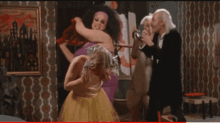CGIs were used in the 80's (like in Tron) so this is quite arbitrary.
90's movies (and even pre-HD early 00's) had a different look and feel from today (yes, even if TLotR looks modern for it).
CGI was used in the 70s (wireframe in the
Star Wars trench run demo and the opening credits of
Superman), but it was still very primitive. Modern CGI was barely used until the 90s. (Honestly, not enough people watched
Willow for it to catch on until
T2.)
There were artistic differences (such as the "90s cool" look of
The Matrix,
X-Men, etc), but the tech was basically the same. The only big change has been digital cameras, and the effect of them is replicated in remasters of 90s/00s films. (Ironically, early digital films like
28 Days Later and
Attack of the Clones look more dated than these remasters.)
It's been fifteen years since the 2000s ended, I think we can consider them old (:
The rule used by historians is that it's not "history" if it happened less than 20 years ago; it's just current events which will eventually be history. That said, artistic movements don't fit into perfect numerical barriers; just look at how literary scholars can't decide if the post-modern era (1945 to ????) ended yet or not.
I've noticed that psychologically we're all acting as if the year 2000 is still the present for decades.
We've either stagnated or the psychology behind the turn of the millennium made us less far from it than the last century.
For music, it's a result of music technology stagnating. We've had 2 big changes in music tech since the early 00s: improved voice synthesizer software (such as Vocaloid) and AI. Neither of these have made big waves in mainstream music, as both are opposed by a lot of singer/songwriters and even by most of their fans. And pretty much all "new" genres that have emerged are just variants of older genres (synthwave, vaporwave, etc). So we essentially aren't getting "new" music because we haven't advanced the technology to the point that artists can/will/want to make anything "new."
(Note: This is not some rant against Vocaloid or anything mentioned above; I'm just explaining why it hasn't changed mainstream music worldwide.)
Then why a movie from 1999 would be considered retro while a 2005 one wouldn't be?
So what about a movie from today with little to no CGI, using film over digital cameras as well as no color correction?
Good question. There's a movie called
The House of the Devil (2009) that I would recommend watching. It is extremely meticulous in making itself look like an early 80s film, down to the pacing being slowed down to the time's standard. So without context, you would assume it was an 80s film. But realistically, it is not. A really good imitation is not the real thing. The time period it was made in also matters because we're talking about old, not old cosplay.
Kids these days couldn't tell a Merchant-Ivory production from an MGM musical roadshow presentation!
Ya, so many kids these days claim
Fritz the Cat is their favorite Disney film.
I disagree sorry.
the 90's had some cultural elements and camera you don't see nowadays. CGIs or not.
I didn't see Starship Troopers or Forrest Gump thinking it could fit as a modern movie simply because they were not made from this century alone.
You are right that the culture is different. That's especially true if you watch comedies or tech thrillers. But the technology used to make the films isn't too different, especially when compared to previous decades. The high quality 35MM film that became the Hollywood standard by then transfers very well to digital form, and color correction and lighting were much better than in decades past. (Only night shots stand out as looking different, as extreme low light shots were not yet possible.)
Starship Troopers was a future sci-fi movie.
Forrest Gump was a period piece. They wouldn't be much different if filmed today.


